POLL SECURITY OP-ED
Protecting election observers to bolster peace and democratic resilience in Mozambique
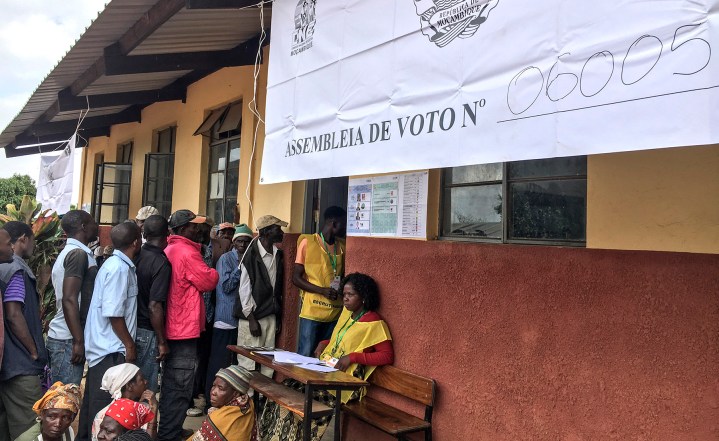
This week, on 11 October, Mozambicans will vote to choose their representatives in 65 municipalities across the country in the sixth municipal elections. Ensuring the protection of election observers is going to be critical to the credibility of the election. But this means we have to protect them and treat them as human rights defenders.
These are the first elections since the closure of the last Mozambican National Resistance (Renamo) military base in June 2023, out of the 16 that remained since the signing of the General Peace Agreement in 1992.
Therefore, these are the first elections to take place in the context of effective peace, at least in terms of the absence of weapons of war in the hands of political parties.
In the past, Mozambican elections have been marked by irregularities, casting doubt on their credibility. They have also been marred by politically motivated violence, affecting not only electoral participation but also electoral observers and political party agents. Electoral violence has undermined the consolidation of democratic progress and, importantly, deterred voters from participating in electoral cycle processes, resulting in large-scale voter suppression.
In 2019, violence against election observers reached its peak with the brutal murder of observer Anastacio Matavel in Gaza province. This incident prompted efforts to build trust in election observers, who are classified as human rights defenders in the United Nations Declaration on Human Rights Defenders.
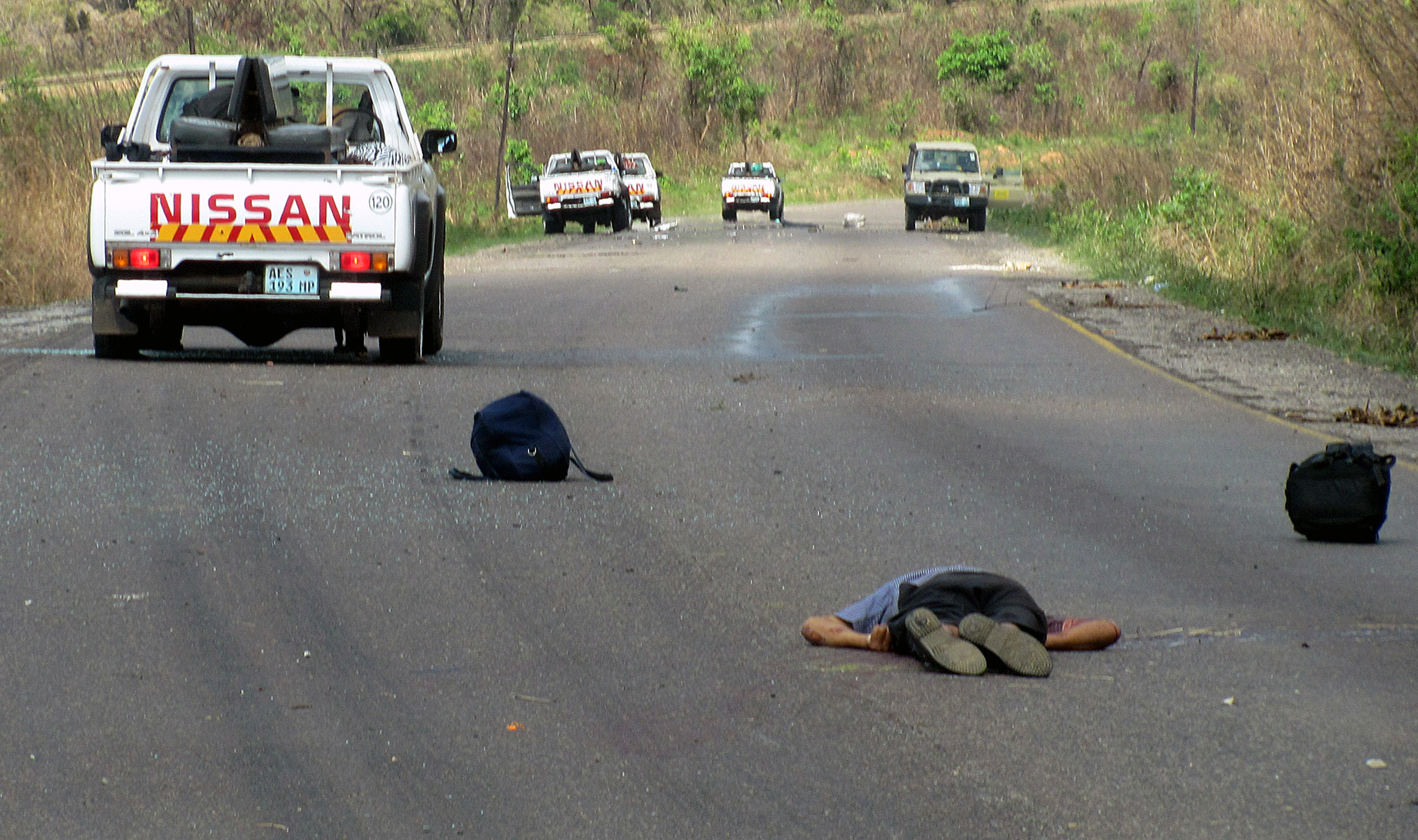
A body at the scene of an attack targeting the convoy of Renamo, the Mozambican National Resistance party, on national road 6 (EN6) in Zimpinga, district of Gondola, on 25 September 2015. According to reports, Mozambique’s opposition leader of Renamo, Afonso Dhlakama was unharmed in the attack. He was attacked twice in under two weeks in Manica province. (Photo: EPA / Andre Catueira)
Consequently, there is an urgent need to establish infrastructures and platforms for their protection throughout the entire electoral cycle.
It is within this context that the Mozambique Human Rights Defenders Network and the Southern Africa Human Rights Defenders Network, in partnership with the Institute of Sponsorship and Legal Assistance (IPAJ) of the Ministry of Justice, Constitutional and Religious Affairs, and the National Human Rights Commission, with the support of the European Union through the Building Resilience, Inclusiveness and Capacity of Human Rights Defenders (BRIC) project, are promoting this initiative to safeguard the civic space and protect electoral observers as well as voters.
This intervention aims to ensure holistic protection of observers when they are exercising their agency to defend human rights and other fundamental freedoms.
History of electoral violence
Mozambique has a chequered history of electoral violence.
Although Mozambique gained independence in 1975, the subsequent civil war meant that democratic elections did not take place for almost 20 years. Since what Mozambicans call the “democracy founding elections” in 1994, subsequent elections have been marked by incidents of electoral violence. While these incidents have decreased over time, there is a lingering perception that the legacy of the civil war persists within democratic institutions. This is partly due to the excessive control of the state by the Frelimo party, the former national liberation movement.
Meanwhile, Renamo, the former rebel movement, maintains significant political influence.
The electoral management and electoral justice institutions have become overly legalistic, with limited understanding of the political economy of democratic processes including elections.
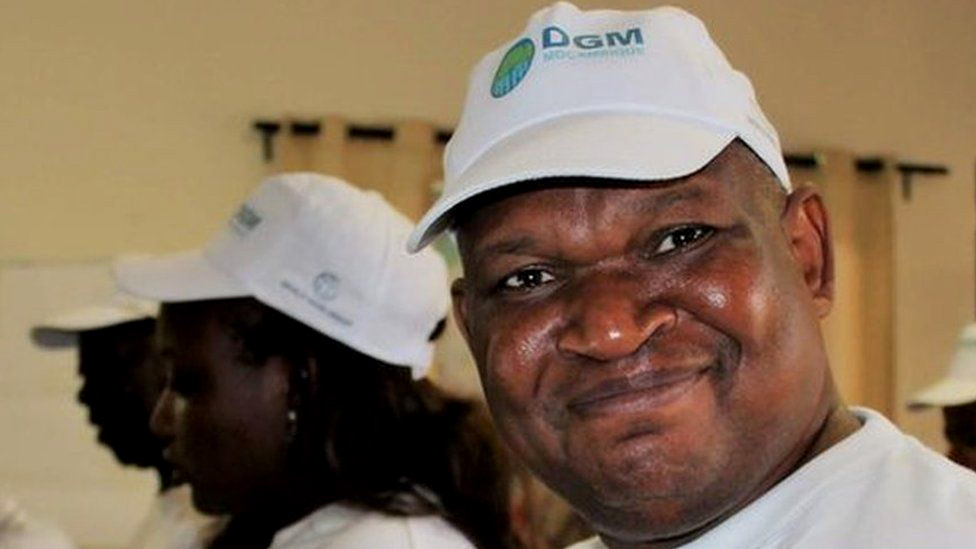
Election observer Anastacio Matavel was killed after leaving an election training workshop in 2019. (Photo: BBC / Wikipedia)
In addition, the current political system, which is based on a “winner takes all” model, has led to political, economic and social marginalisation and exclusion of opposition parties and alternative voices. There is also a lack of trust in electoral management institutions, and transparency in their actions is often lacking.
In 1999, Renamo allegedly won the general elections, but electoral fraud prevented the former rebel movement from forming a government. What we see is that electoral governance has been markedly fraudulent, benefiting the party in power, and there has been violence during the electoral campaign, but also after elections, such as in the 1999 general elections, which resulted in violence throughout the country, with people losing their lives and being detained, especially in Montepuez, in the province of Cabo Delgado.
For this article’s purposes, the trend threatening electoral integrity in Mozambique has emerged since the 2019 elections. This includes attacks on election observers and political party delegates monitoring the voting process.
It was in the 2019 election that election observer Matavel, from Gaza province, was murdered in a barbaric manner while preparing to organise an election observation mission. This occurred during the electoral campaign, and during the voting process, 18 young election monitors delegated from the New Democracy Party were detained for monitoring the vote-counting process.
Within this context the need and urgency to classify election observers as human rights defenders became increasingly evident. This is due to the role election observers play in realising the right to vote and the right to freedom of expression, as enshrined in the SADC guiding principles on free and fair elections, in the constitution of the Republic of Mozambique and in electoral laws.
In light of the 11 October municipal elections, the BRIC Project, an innovative initiative, will protect election observers as they are human rights defenders. The release of the statement on “The Situation of Election Observers as Human Rights Defenders” by Clement Nyaletsossi Voule, the UN Special Rapporteur on the Rights to Freedom of Peaceful Assembly and of Association, and Mary Lawlor, Special Rapporteur on the Situation of Human Rights Defenders, has bolstered the positive narrative of election observers as human rights defenders.
Read more in Daily Maverick: Mozambique’s local elections loom amid low-level guerilla war, silent general strike
To ensure holistic and intersectional protection of election observers, the BRIC Project will establish safe houses and hotlines in municipalities considered to have a history of violence in the south, centre and north, in partnership with the IPAJ.
The objective is to establish a platform for support and legal assistance to all those who, because of their electoral work, need prompt legal assistance. Therefore, it is an initiative in partnership with entities from the state itself, to reinforce the role of the state in protecting the rule of law in Mozambique.
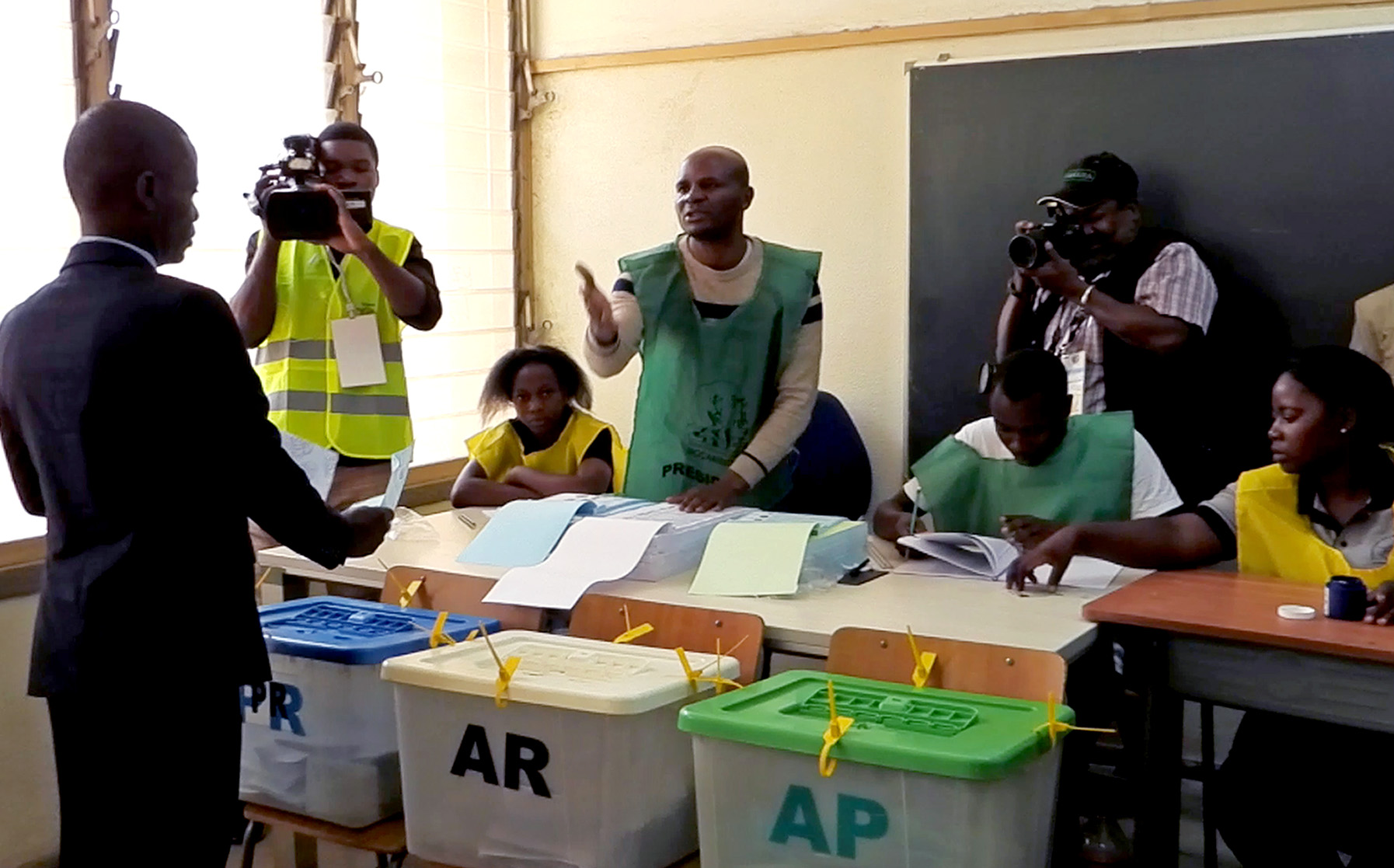
Mario Albino, president of the United Movement for the Integral Salvation, votes at a polling station in Nampula city, Nampula province, Mozambique, on 15 October 2019. (Photo: EPA-EFE / Vasco Quembo)
Protection of observers as human rights defenders
Election observers are key to peace-building in Mozambique. Elections in the country have been seen as contributing to the climate of violence due to marked fraud and a perceived lack of credibility. Therefore, it is necessary to protect human rights defenders and election observers so they can have confidence that, despite the threats they face, they can observe the elections and remain at the polling stations during the vote count – which always takes place at night and often with low light – as they will be protected against verbal or physical attacks.
The protection, which now begins in the final part of the electoral campaign, extends to the post-electoral period, mainly because in local elections, electoral observers must be natives of local authorities, and local authorities are relatively small territorial districts, where observers are known.
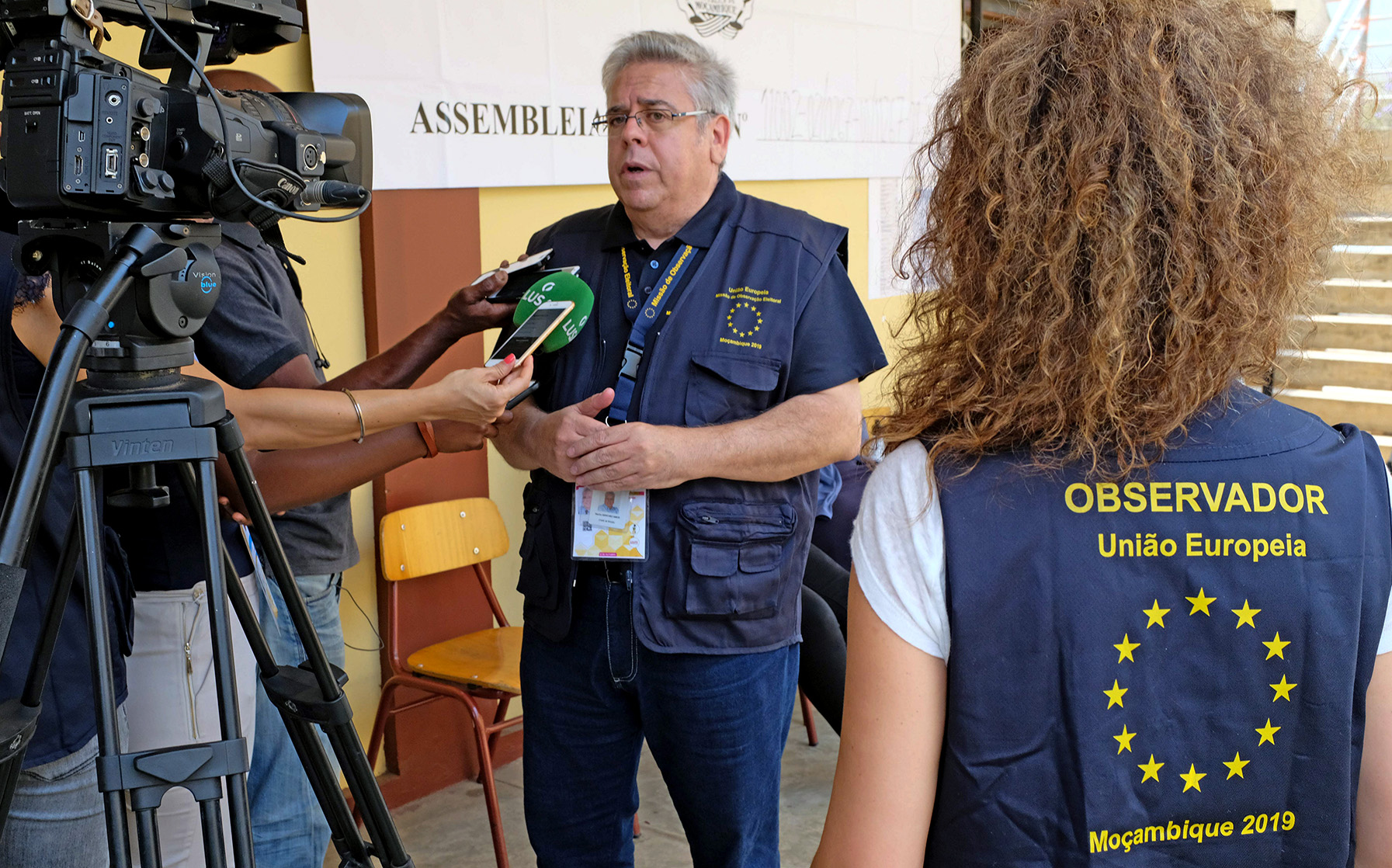
Nacho Sanchez, chief of the European Union team of observers, talks to the press at a polling station in Maputo, Mozambique, on 15 October 2019. (Photo: EPA-EFE / Antonio Silva)
Therefore, protection covers the entire post-election period, so that observers have the security to continue their work. This protection includes taking observers at risk to a safe place and, if necessary, to where the Southern Africa Human Rights Defenders Network temporarily relocates those at risk, and may continue for much longer, through the “Ubuntu cities hubs”, within the scope of the partnership with AfricanDefenders.
Therefore, it is a more holistic initiative that has short-, medium- and long-term dimensions, also focusing on voters, those who will be victims of abuses of power, being eligible for this protection. The initiative is in the experimental phase and the Mozambique Human Rights Defenders Network will consolidate its action after learning lessons from this phase. DM
Professor Adriano Nuvunga is director of the Centre for Democracy and Human Rights in Mozambique and chairperson of the Southern Africa Human Rights Defenders Network, and leads the activities of the Mozambique Human Rights Defenders Network.




















 Become an Insider
Become an Insider
Comments - Please login in order to comment.